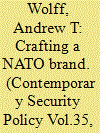|
|
|
Sort Order |
|
|
|
Items / Page
|
|
|
|
|
|
|
| Srl | Item |
| 1 |
ID:
129670


|
|
|
|
|
| Publication |
2014.
|
| Summary/Abstract |
NATO confronts four distinct public perception challenges: weak or varying public support for the alliance and its specific missions; a general lack of public awareness of the alliance's post-cold war transformation; diverging opinions on its proper role in the world; and parochial and domestic interests filtering into NATO's agenda. These various public relations challenges detract from alliance cohesiveness, impede mission performance, breed confusion and dissension about alliance aims, and raise questions about the proper operation of democratic governance within the alliance. Recent alliance communication efforts encompassing public diplomacy and strategic communications have failed to improve these public perception challenges. Instead, NATO should consider adopting a long-term branding strategy that focuses specifically on shaping the public's mental image of the alliance through the creation, promulgation, and management of a core message. Such a strategy has the potential to create a more consolidated alliance mandate that is easier for the public to understand and, ultimately, transforms the way NATO relates to its public.
|
|
|
|
|
|
|
|
|
|
|
|
|
|
|
|
| 2 |
ID:
141286


|
|
|
|
|
| Summary/Abstract |
Russian President Vladimir Putin claims that his country's annexation of Crimea in March 2014 was partly in response to NATO enlargement. NATO leaders counter that eastern enlargement is not a cause of the Ukraine crisis, and they argue that enlargement does not threaten Russia, but rather it creates stability for all of Europe. This article examines the history of NATO–Russian tensions over enlargement, considers how NATO's enlargement policy factored into the Ukraine crisis, and reviews options for the future of enlargement. Drawing on diplomatic history and geopolitical theory, the article explains Russia's persistent hostility towards NATO's policy of eastward expansion and highlights NATO's failure to convert Russia to its liberal world-view. The alliance's norm-driven enlargement policy has hindered the creation of an enduring NATO–Russia cooperative relationship and helped fuel the outbreak of conflict in Georgia and Ukraine. In light of this, NATO should alter its current enlargement policy by infusing it with geopolitical rationales. This means downgrading the transformative and democratization elements of enlargement and, instead, focusing on how candidate countries add to NATO capabilities and impact overall alliance security. A geopolitically-driven enlargement policy would prioritize countries in the Balkan and Scandinavian regions for membership and openly exclude Georgia and Ukraine from membership. Ultimately, this policy would have the effect of strengthening NATO while giving it more flexibility in dealing with Russia.
|
|
|
|
|
|
|
|
|
|
|
|
|
|
|
|
| 3 |
ID:
158027


|
|
|
|
|
| Summary/Abstract |
This article investigates the connection between invitations to intervene and the creation of legitimacy for European Union (EU) and North Atlantic Treaty Organization (NATO) operations. By tracking the incidence and source of pleas for an intervention, this study finds that invitations are associated with most EU and NATO interventions, and identifies three different types of invitations – true, collaborative, and rigged – which denote greater or lesser degrees of demand for Western security services. This variability in demand for Western security services signalled by the three types of invitations impacts the level of legitimacy associated with an EU or NATO operation: true invitations confer the greatest amount of legitimacy, collaborative invitations generate weaker legitimacy, and rigged invitations create low levels of legitimacy. Moreover, both organizations have, at times, coerced external political actors into offering an invitation to intervene in order to manufacture stronger legitimacy for their interventionist designs. Ultimately, because invitations play such a large role in prompting EU and NATO interventions, international relations scholars and political leaders should carefully consider their quality and influence on the decision-making process when determining the initial legitimacy for an interventionist operation.
|
|
|
|
|
|
|
|
|
|
|
|
|
|
|
|
|
|
|
|
|